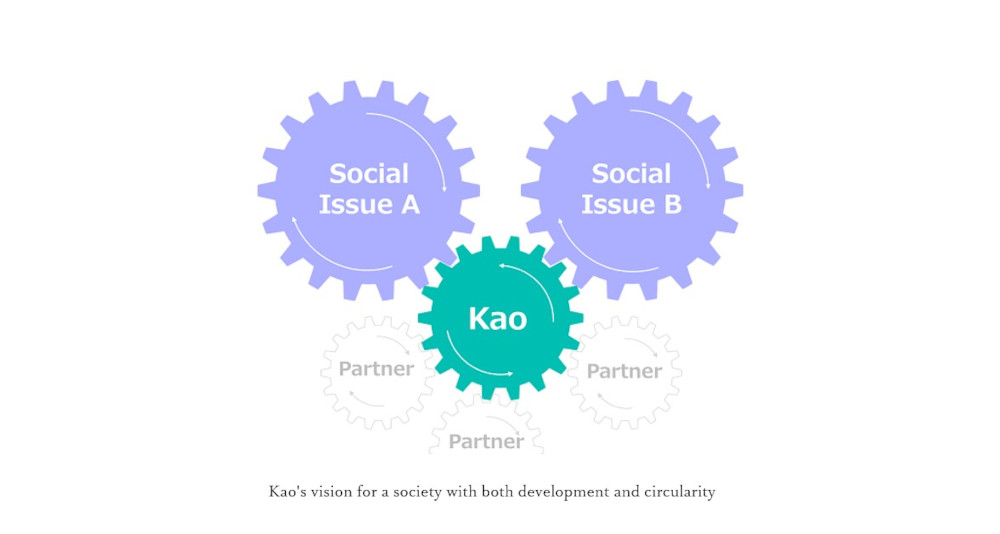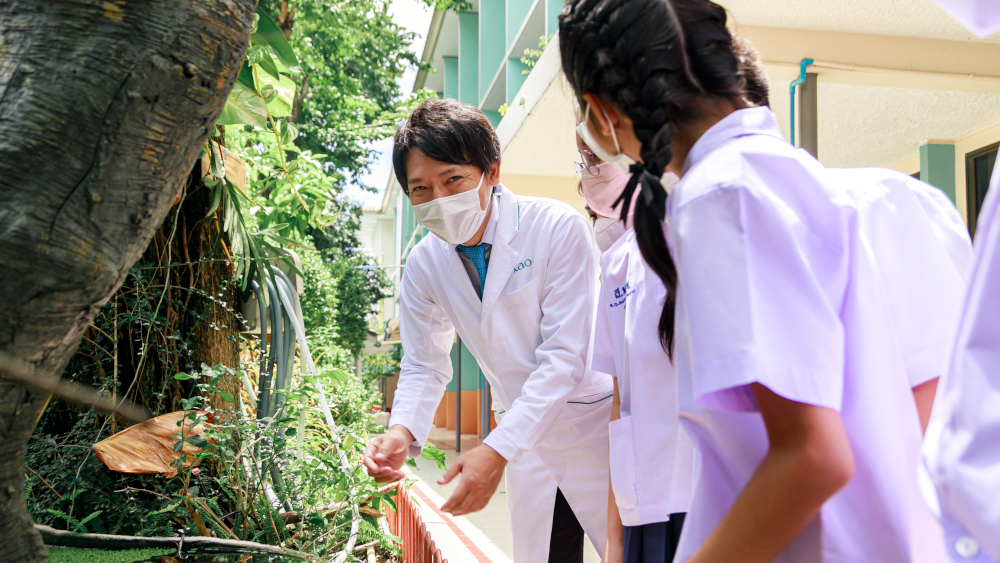Approximately one million people die annually worldwide from mosquito-borne
infectious diseases. In Southeast Asia, in particular, the spread of dengue
fever — which is transmitted mainly by yellow-fever mosquitoes — remains a
social issue. To solve this problem, Kao Corporation
launched its Guard Our
Future project —
centered on an innovative concept of a product that keeps mosquitoes away from
people's skin — globally to protect future lives from mosquitoes. According to
Mitsutoshi Kamiya, VP
of Health & Beauty Care Asia (International) Business at Kao Corporation, the
goal of the project is to develop a new model to balance both business
activities and activities to solve social issues, in order to achieve Kao's
mission to "create a Kirei life for
all
— providing care and enrichment for the life of all people and the planet."
In pursuit of its mission, Kao promotes its mid-term plan with the vision of
"Protecting future lives — sustainability as the only path" along with its
"Kirei Lifestyle Plan" ESG strategy, formulated in 2019.
At Sustainable Brands 2022
Yokohama, Kao President and
CEO Yoshihiro Hasebe used
gears to illustrate the idea of a "society that has both development and
circularity.” He declared that by identifying the relationship between seemingly
separate social issues and utilizing innovative technologies, “we aim to build a
business model that is appealing to many partners and will invite collaboration.
Kao will strive to be the gear that connects them; and by linking multiple
social issues and business models, we aim to realize a 'society that circulates
while developing' — where business development and the resolution of social
issues are self-sustaining."

One new business model where Kao could serve as a "gear" is the Guard Our Future
project.
Dengue fever threatens areas home to half the world’s population
Mosquitoes are the deadliest creatures on the planet; and according to 2022 data
from the German online platform Statista, one million people die annually from
mosquito-borne infectious
diseases.
Although most of these people are on the continent of Africa, people in
Southeast Asia also suffer mosquito bites and are exposed to the risk of
mosquito-borne infectious diseases such as dengue fever on a daily basis. Most
of those infected are children.
Mosquitoes themselves are not significantly affected by the virus, but they can
transmit it to humans through their bite. Mosquitoes that transmit dengue fever
are vulnerable to cold weather; but their habitat is expanding due in part to
global warming. Since they can multiply in small amounts of unclean water, such
as water pooled in garbage on the street, there is a growing concern that the
infection could further spread in areas undergoing economic development and
urbanization.
As of 2018, the World Health Organization and UNICEF have found that in the
future, 3.9 billion people in 128 countries, which are home to approximately
half of the world's population, will be at risk of contracting dengue fever.
The sale of repellent alone will not reduce infection
Kao's Bioré brand offers a lineup of products
that protects skin from a variety of environmental stress factors, based on the
idea that the skin is the interface between people and society. Bioré Guard Mos
Block
Serum
is a mosquito repellent based on a repellent technology that makes the skin
surface repulsive to mosquitoes causing them to fly away before biting it; the
goal is not to kill mosquitoes, but to reduce the infection caused by mosquitoes
by protecting the skin. This product is representative of Kao's commitment to
solving social issues according to its vision to protect future lives.
The Guard Our Future project was launched in February 2022 by donating
approximately 20 million yen worth of Bioré Guard Mos Block Serum to the Thai
Ministry of Public Health. Then, in June 2022, Kao began selling the same
product in Thailand. However, Kamiya emphasizes that providing Bioré Guard Mos
Block Serum itself will not reduce dengue fever. It is impossible to prevent
infection unless people play an active role in protecting their own health
(avoid mosquito bites); so, it is necessary to transform people's mindsets.
Mosquito repellents that are commonly used today have odors that repel
mosquitoes or use DEET — a volatile, chemical repellent. Since such ingredients
may have an unpleasant smell or texture, Thai people — especially children — are
not in the habit of using mosquito repellents on a daily basis. To prevent
transmission of dengue fever, there’s a need to continue to communicate the
importance of protecting ourselves from mosquito bites. Therefore, in
conjunction with ASEAN (Association of Southeast Asian Nations) Dengue
Day on June 15 — which was established
with the aim of eliminating dengue fever from ASEAN — Kao holds educational
events in Thailand with the participation of the Thai Ministry of Public Health
and the local affiliate of Takeda Pharmaceutical
Company (Takeda Thailand) since 2022.
 Special program class at Phyathai School, Bangkok, September 2022
Special program class at Phyathai School, Bangkok, September 2022
The project focuses on three main areas: community activities, raising awareness
among the next generation, and dengue fever forecasting. Community activities
include working with the industrial park association in the area home to the Kao
plant, and with local residents to remove puddles where mosquitoes lay eggs and
abandoned garbage where puddles are likely to form.
To educate the next generation, project members visit schools to hold classes
about dengue fever and look for places where mosquitoes could be present on the
school premises with children, in collaboration with Takeda Thailand and local
distributors. Another initiative is called dengue fever forecasting, which aims
to protect lives from dengue fever by providing information. The team is working
on developing capabilities for
RooTan
— an app run by NECTEC, an affiliate of the Thailand National Science and
Technology Development Agency — to provide extensive information on this
infectious disease. The map on this app shows the real-time number of dengue
fever cases in each region, which is color-coded. In the future, they will add a
feature to project how many more cases are expected in each region.
Instilling the mission of protecting future lives among employees of Kao Thailand
The Guard Our Future project would not have developed to become a
public-private-academic initiative without the understanding and actions of
local employees in Thailand.
Kamiya, who has been at Kao Thailand as the head of marketing since 2021, was
the driving force behind the launch and promotion of this project. In launching
the world's first Bioré Guard Mos Block Serum, he did not take the conventional
approach of simply advertising and distributing the product. The core products
of the Thai business are detergents, and hygiene and home-care products; and the
local employees focus on sales strategies for detergents.
"In Japan, it is easier to gain an understanding of the sustainable value of
projects. However, since Kao is a small company and brand outside Japan, we
often struggled getting our messages across," Kamiya says. Moreover, the early
days of the project were in the middle of the pandemic and communicating with
the team while remote working was often a challenge. However, he carefully
explained that the purpose of this project was to realize the Kao Group's vision
of protecting future lives, the social significance of promoting the
initiatives, and his own passion for the Guard Our Future project.
His enthusiasm came across to local employees, who reached out to doctors of the
Ministry of Public Health to explain Kao's mosquito-repellent technology. The
key stakeholders of the Ministry related to and highly regarded Kao's philosophy
and technology, which led to their collaboration.
In Thailand, Kao’s collaborative initiatives with the Ministry of Public Health
and Mahidol University have earned them the trust and collaboration from
numerous companies. One company purchased the product for employees at its
factory in Thailand and to donate to local elementary schools.
"The Japanese Embassy in Thailand also related to the idea of solving the social
issues of ASEAN with Japanese technology and helped us in many ways. Many people
are relating to and joining our initiative," Kamiya says.
After launching in Thailand, Kao plans to expand the Guard Our Future project to
other countries with a large number of infection cases, especially in ASEAN.
A business model that balances business and solutions to social issues
Kamiya hopes to establish a self-sustaining model for sustainability to fund
support for areas with a high number of dengue fever cases lacking effective
countermeasures by widely distributing Bioré Guard Mos Block Serum.
"Sustainability initiatives are often scaled back or canceled if the core
business is not performing well. We need a system that can properly run on its
own so that we won't ever have to put a stop to this initiative," he says.
Two years into the initiative, he says Kao still has a long way to go — as they
have implemented the initiatives only in Thailand and have yet to progress
enough to reduce the number of dengue fever cases and transform people’s
mindsets. Not yet satisfied with the progress, Kamiya says, "I feel that there
are more people we could have saved. I want to further increase sales to obtain
the capital for sustainability initiatives as soon as possible."
The immediate goal is to expand the initiatives to other Asian countries as
quickly as possible; Kamiya says they are discussing plans to further promote
our initiatives by utilizing Japanese companies' technologies with their
partner, Takeda Pharmaceuticals. At the same time, it is also important to make
the Guard Our Future project known in Japan.
Indeed, a system that expands the community of project participants is a society
that circulates while developing, which Hasebe aims to achieve.
Get the latest insights, trends, and innovations to help position yourself at the forefront of sustainable business leadership—delivered straight to your inbox.
Sustainable Brands Japan
Published Jan 5, 2024 11am EST / 8am PST / 4pm GMT / 5pm CET